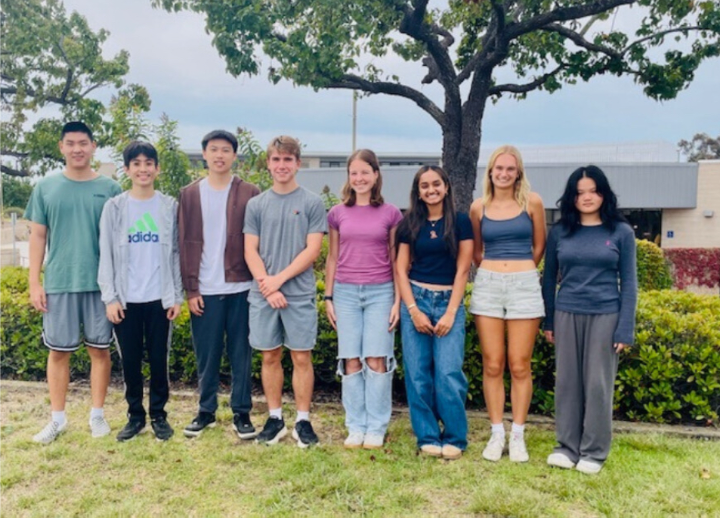
(Left to right) Ethan Wang (12), Chutian (Andrew) Chen (12), Eric Xie (12), Ian Smee (12), Collier Lawson (12), Nila Mehta (12), Sophie Laughlin (12) and Sarina Feng (12) are the school’s eight semifinalists from the class of 2026. The semifinalists were announced on Sept. 10. Photo courtesy of TPHS Foundation.
Eight students from the school — Chutian (Andrew) Chen (12), Sarina Feng (12), Sophie Laughlin (12), Collier Lawson (12), Nila Mehta (12), Ian Smee (12), Ethan Wang (12) and Eric Xie (12) — were named National Merit Semifinalists on Sept. 10, placing them among the top one percent of high school seniors recognized for their academic excellence on the Preliminary SAT/National Merit Scholarship Qualifying Test (PSAT/NMSQT).
According to the school’s testing coordinator, Alexa Rogers, eight out of the 270 students from the school’s class of 2026 who took the exam were awarded semifinalists, compared to the class of 2025, where three out of the 280 students who took it received the award.
“I’m proud of myself for doing something that not many people accomplish, and I self-studied for it, so I am proud of myself for getting there,” Lawson said.
After becoming a semifinalist, students have the opportunity to apply to become a finalist by completing an application containing an essay, high school transcript, letters of recommendation, and a confirming SAT or ACT score. Finalists are awarded a one time award of 2,500 dollars and corporate-sponsored scholarships.
“[Being a semifinalist] is significant for me because it opens the door to applying to become a finalist and scholarships that can relieve the financial burden of going to college,” Feng said.
Because many students have already studied for or taken the SAT or ACT, few exclusively prepare for the PSAT/NMSQT.
“I think the best way to prepare was taking the SAT,” Mehta said. “I first took the August SAT, and to study for that, I did a lot of Bluebook practice tests and used Khan Academy. I started the summer after my sophomore year and sat down once a week to do a practice test or learn some of the grammar rules and math formulas. I think the PSAT was similar but definitely easier than the actual SAT, but you’ll definitely feel a difference.”
In addition to general test preparation, many of the semifinalists emphasized the importance of recognizing patterns or strategies tailored to the PSAT, SAT, and ACT.
“For the reading, it’s very formulaic, and you may not expect that because it’s an English section, but like a standardized test, there has to be a right answer,” Lawson said. “There’s not a lot of nuance to the reading ones. I did so many practice tests, so I started recognizing patterns.”
While academic preparation was a major factor behind their success, managing a relaxed mental state before the test was just as important.
“I was definitely really nervous,” Laughlin said. “I just did things that are familiar, like watching a comfort movie the night before. I feel like a couple days afterwards it’s all you can think about, and then you kind of just let other things take over in your mind, so you’re not too worried about it.”
Chen also emphasized the importance of keeping a calm composure before the exam.
“It’s important to realize that you don’t [have to] put too much pressure on yourself,” Chen said. “You just have to put an answer choice and trust yourself. You’ll forget about it in probably a week, and it’s not going to be that big of a deal.”
With the PSAT behind them, many seniors are shifting their focus beyond testing and academics. For instance, Xie said that he hopes to “get a little more creative, try to branch out and maybe try to develop programs to help other kids.”
“I feel like there’s a lot of utilities or resources that aren’t being used,” Xie said. “Maybe not even like creating something, but trying to spread the word for something for some of these programs.”
Similar to Xie, other semifinalists hope to use their last year of high school to focus on their personal growth and interests.
“I want to explore more things I’m passionate about, and learn some skills that I’ve been putting off because there aren’t so many deadlines, upcoming tests and things to worry about, so I can explore what I want for myself and what I’ve been working towards,” Feng said.